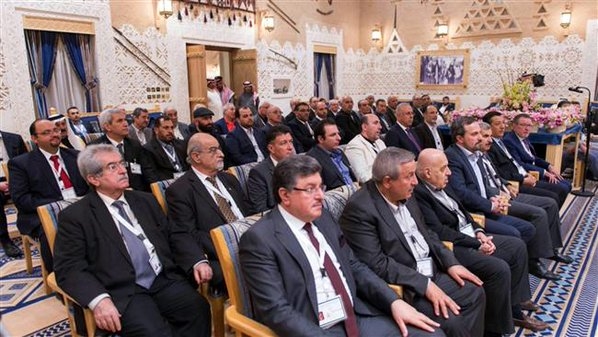The supreme committee of the Syrian opposition's conference in Riyadh, which consists of 34 political and 11 military figures, conducted a series of talks with representatives of the Friends of Syria Group and a number of other officials to discuss the results of the Saudi summit.
The talks were aimed at planning for upcoming meetings in the Saudi capital next Thursday and Friday, which will prepare the committee for negotiations with a delegation from the Assad government in Geneva next month. Representatives of armed opposition factions in Syria now make up one-third of the commission and negotiating delegation.
A day after the conference, businessman and opposition figure Walid al-Zoubi was also appointed to the supreme committee after members had given a new seat to armed faction representatives, who occupy 11 of a total 34 seats. The committee also includes nine members of the Syrian National Coalition and five members of the National Coordination Committee, as well as a number of other independent members.
Members of the committee – excluding Ahrar Al-Sham representative Labib Nahhas – held a meeting with representatives of the Friends of Syria Group, to discuss the closing statement of Riyadh conference. The opposition envoys shared their proposals for the political process and the results of the International Syria Support Group statement published last month; while representatives also discussed the necessity of preparing for negotiations with the regime’s delegation.
It is clear that the closing statement contains three points that will require clarification before attending talks in Geneva, including those related to: "(President) Assad’s departure at the beginning of the transition period"; talk from Western officials about "setting a definite timeframe” for Assad’s departure; and whether his departure will be effective upon the signing of the agreement or once the transitional period commences. In addition, members discussed the relationship between a possible ceasefire and transitional period, as the statement specifies that a ceasefire would begin following the formation of transitional institutions (even though these institutions were not identified). Other matters that were discussed included possible international guarantees related to confidence building measures prior to the beginning of negotiations with representatives of the Assad regime, as this issue also remains ambiguous.
This is expected to be one of the major issues to be discussed in the committee’s meetings in Riyadh next weekend. One of the suggestions involves the committee’s formation of a roadmap or a set of “principles and mechanisms” that the negotiating delegation will take to Geneva, where "goals, mechanisms, and red lines" will be determined.
The second term will involve the election of a committee president, who will remain in Riyadh for all necessary facilitations. It appears that Syria’s dissident prime minister Riyad Hijab will likely head the committee. It will also include the formation of a bylaw to appoint media officials and elect the negotiating delegation. It is said that the delegation will consist of 15 members, “the representatives of the fighting factions (four members), the Coalition (six members), the National Coordination Committee (three members) and two independents.”
Officials anticipated grievances from Damascus about the participation of represeanttives from armed factions in the negotiating delegation, because “the regime considers them terrorists and will refuse to sit with them at the same table," adding this could also “embarrass Russia”.
Arab countries managed to obtain US support for their rulings towards Ahrar Al-Sham and the Army of Islam, which avoided being placed on the list of Syrian terrorist organizations. In addition, the participation of their representatives in the conference was striking. Negotiations are underway among Ahrar Al-Sham members in an attempt to finalize a decision about the results of the conference.
Abdulaziz Sager, the head of the Gulf Research Center and manager of the conference sessions, suggested moving 116 members of the conference to a general committee and to turn the supreme committee for negotiations into a general secretariat. Sager also suggested electing a leadership commission for the conference and to provide them with a permanent headquarters in Riyadh. However, Riyadh will already likely be the permanent headquarters of the supreme committee, which will lead the negotiations.
It has become clear that some of Coalition members were concerned about attempts to form a new political body to take its place. People are expecting regional communications to discuss this issue.
Hassan Abdulazim, the general coordinator of the National Coordination Committee, met with the Russian ambassador's team in Riyadh to inform them of the conference’s results. Abdulazim told Al-Hayat: “The conference was successful on all levels, as everyone – including the fighting factions – adopted the political solution, which is a very important thing."
He also pointed out, "the statement could have been written in more detailed political language, but it is still a good result because it insists on a political solution according to the Geneva statement and the Vienna course."
Abdulazim also noted the importance of solving the problem of not including other political blocs including: the Kurdish Democratic Union Party, led by Saleh Muslim; the Popular Front for Change and Liberation, led by Qadri Jamil; and the Syrian Democratic Forum, led by Samir Aita. Abdulazim suggested adding their representatives to the supreme committee and the negotiating delegation. There was also the suggestion of including women representatives in the committee and the delegation.
This article was translated and edited by The Syrian Observer. Responsibility for the information and views set out in this article lies entirely with the author.


